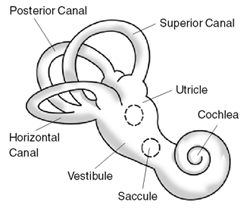Balance disorder
Editor-In-Chief: Prab R Tumpati, MD
Obesity, Sleep & Internal medicine
Founder, WikiMD Wellnesspedia &
W8MD medical weight loss NYC and sleep center NYC
| Balance disorder | |
|---|---|

| |
| Synonyms | N/A |
| Pronounce | N/A |
| Specialty | N/A |
| Symptoms | Dizziness, vertigo, unsteadiness, nausea |
| Complications | Falls, injuries |
| Onset | Any age, more common in older adults |
| Duration | Varies |
| Types | N/A |
| Causes | Inner ear problems, neurological disorders, medications, head injury |
| Risks | Age, ear infections, head trauma, medications |
| Diagnosis | Clinical examination, audiometry, vestibular testing |
| Differential diagnosis | Meniere's disease, vestibular neuritis, labyrinthitis, migraine-associated vertigo |
| Prevention | N/A |
| Treatment | Vestibular rehabilitation therapy, medication, surgery |
| Medication | N/A |
| Prognosis | Varies depending on cause |
| Frequency | Common, especially in older adults |
| Deaths | N/A |
Balance disorder is a condition that makes an individual feel unsteady or dizzy, as if they are moving, spinning, or floating, even when they are standing still or lying down. Balance disorders can be caused by several different conditions affecting the inner ear, brain, or sensory nerve pathways. The sense of balance is primarily controlled by the vestibular system in the inner ear, alongside inputs from the visual system and the proprioceptors in the muscles and joints, which help the body understand its position in space.
Causes[edit | edit source]
Balance disorders can have various causes, including but not limited to:
- Vestibular disorders: Problems in the inner ear, such as benign paroxysmal positional vertigo (BPPV), Meniere's disease, and vestibular neuritis.
- Neurological disorders: Conditions that affect the brain or nerves, such as stroke, multiple sclerosis, and Parkinson's disease.
- Medications: Some medications can affect balance as a side effect.
- Infections: Ear infections can lead to temporary balance problems.
- Head injuries: Trauma to the head can disrupt the inner ear or brain functions related to balance.
Symptoms[edit | edit source]
Common symptoms of balance disorders include:
- Dizziness or vertigo (a spinning sensation)
- Feeling of floating or feeling as if one is going to fall
- Blurred vision
- Confusion or disorientation
- Nausea and vomiting
- Changes in heart rate or blood pressure
- Fear, anxiety, or panic
Diagnosis[edit | edit source]
Diagnosing balance disorders involves a thorough medical history review and physical examination, including neurological tests. Additional tests may include:
- Hearing tests
- Balance tests, such as the posturography test
- Imaging tests, like MRI or CT scans, to look at the inner ear and brain
- Blood tests to check for infections, inflammation, or other conditions that could affect balance
Treatment[edit | edit source]
Treatment for balance disorders depends on the underlying cause. Options may include:
- Medications to treat the symptoms or underlying conditions
- Physical therapy or vestibular rehabilitation to improve balance
- Surgery, in cases where there is a structural problem in the inner ear
- Lifestyle changes, such as dietary modifications in the case of Meniere's disease
Prevention[edit | edit source]
While not all balance disorders can be prevented, some measures can reduce the risk or severity of symptoms:
- Avoiding rapid changes in position
- Using caution on uneven surfaces
- Reducing or eliminating use of substances that can affect balance, such as alcohol and certain medications
- Regular exercise to improve strength, flexibility, and balance
See Also[edit | edit source]
Search WikiMD
Ad.Tired of being Overweight? Try W8MD's physician weight loss program.
Semaglutide (Ozempic / Wegovy and Tirzepatide (Mounjaro / Zepbound) available.
Advertise on WikiMD
|
WikiMD's Wellness Encyclopedia |
| Let Food Be Thy Medicine Medicine Thy Food - Hippocrates |
Translate this page: - East Asian
中文,
日本,
한국어,
South Asian
हिन्दी,
தமிழ்,
తెలుగు,
Urdu,
ಕನ್ನಡ,
Southeast Asian
Indonesian,
Vietnamese,
Thai,
မြန်မာဘာသာ,
বাংলা
European
español,
Deutsch,
français,
Greek,
português do Brasil,
polski,
română,
русский,
Nederlands,
norsk,
svenska,
suomi,
Italian
Middle Eastern & African
عربى,
Turkish,
Persian,
Hebrew,
Afrikaans,
isiZulu,
Kiswahili,
Other
Bulgarian,
Hungarian,
Czech,
Swedish,
മലയാളം,
मराठी,
ਪੰਜਾਬੀ,
ગુજરાતી,
Portuguese,
Ukrainian
Medical Disclaimer: WikiMD is not a substitute for professional medical advice. The information on WikiMD is provided as an information resource only, may be incorrect, outdated or misleading, and is not to be used or relied on for any diagnostic or treatment purposes. Please consult your health care provider before making any healthcare decisions or for guidance about a specific medical condition. WikiMD expressly disclaims responsibility, and shall have no liability, for any damages, loss, injury, or liability whatsoever suffered as a result of your reliance on the information contained in this site. By visiting this site you agree to the foregoing terms and conditions, which may from time to time be changed or supplemented by WikiMD. If you do not agree to the foregoing terms and conditions, you should not enter or use this site. See full disclaimer.
Credits:Most images are courtesy of Wikimedia commons, and templates, categories Wikipedia, licensed under CC BY SA or similar.
Contributors: Prab R. Tumpati, MD

